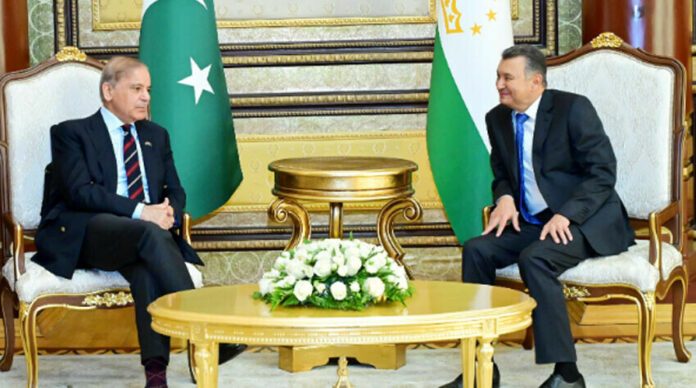Reaffirming Pakistan’s vision for regional unity through trade, he championed the extension of CPEC into Central Asia as a gateway to shared economic revival and strategic cooperation

News Desk
DUSHANBE: Prime Minister Shehbaz Sharif on Thursday voiced Pakistan’s desire for regional peace but cautioned that the international community must not turn a blind eye to India’s “irresponsible conduct and aggressive actions”, calling them a threat to stability in South Asia.
During a high-level meeting in Dushanbe with Tajik President Emomali Rahmon, where he is on a two-day official visit, the Pakistani premier laid out Islamabad’s concerns over escalating tensions with New Delhi. He made it clear that while Pakistan continues to pursue dialogue and regional harmony, it cannot remain indifferent to India’s behavior, which he described as dangerous and akin to an act of war.
The meeting between the two leaders touched on bilateral ties, regional developments, and shared interests. Prime Minister Shehbaz revisited his earlier trip to Tajikistan in July 2024, calling it a turning point that laid the groundwork for deeper cooperation between the two countries. Reiterating Pakistan’s focus on economic and strategic connectivity, he underlined Islamabad’s ambition to extend the China-Pakistan Economic Corridor (CPEC) into Central Asia, a move that he said would bring collective prosperity to the region.
In a pointed reference to Kashmir, Shehbaz stressed that a fair and lasting solution to the long-standing dispute was crucial. “A just resolution of the Kashmir issue, in accordance with UN Security Council resolutions, is essential for lasting peace in South Asia,” he said, reiterating that Pakistan remains committed to peace but will defend its sovereignty and territorial integrity “at all costs”.
While geopolitical tensions dominated the talks, the two sides also found common ground in areas such as climate change and water diplomacy. The Pakistani Prime Minister lauded Tajikistan’s leadership for convening a major international conference on glaciers and environmental challenges—an issue increasingly shaping regional discourse.
President Rahmon responded warmly, describing Pakistan as a reliable and longstanding partner. He commended Shehbaz Sharif’s statesmanship and reaffirmed Dushanbe’s support for peaceful engagement in the region. Tajikistan, he said, looks forward to strengthening collaboration with Pakistan across a range of sectors including agriculture, trade, and industry.



